Summary
This article will compare some of the best competitors to JustCall, focusing on key aspects like features, pricing models, and AI capabilities to help you choose the right solution for your team.
Why Look for a JustCall Alternative?
Several common challenges lead users to seek a different business phone provider. An objective analysis of these factors can help you determine the optimal solution for your organization's needs.
You Need a Better User Experience and Reliability
A business communication system must be dependable. A qualitative analysis of user feedback for JustCall often reveals reports of bugs, service outages, and a confusing setup process. Connectivity issues are a common reason for businesses to switch providers [1]. In contrast, alternatives like Ringover are known for an easy setup process, quality onboarding support, and reliable tools that ensure your team can communicate without interruption.
You Want Cost-Effective and Transparent Pricing
Predictable costs are crucial for budget management. JustCall's pricing structure can be complex; unlimited outgoing calls are restricted to its most expensive plan, which requires a minimum of 10 users [2]. Other plans often charge for calls on a per-minute basis, which can result in unexpectedly high monthly bills. For businesses seeking better value, alternatives like Ringover offer clear, all-inclusive plans starting at just $21 per user per month, which include unlimited calling.
Your Business is Expanding Internationally
For companies with a global reach, international communication is essential. JustCall provides virtual phone numbers from approximately 70 countries and charges for international calls per minute. This model can become costly for teams that frequently connect with clients or candidates overseas. A better option for global businesses is a provider like Ringover, which offers unlimited calls to over 110 destinations on all its plans, making international expansion seamless and affordable.
JustCall Alternatives: At a Glance Comparison
To provide an empirical overview of how the options measure up, here is a brief comparison of the top JustCall competitors.
| Software | Key Features | Pricing | Pros & Cons |
|---|---|---|---|
| Ringover | Unlimited international calls, AI-powered analytics, 100+ integrations, Power Dialer | Starts at $21/user/month | Pros: All-inclusive plans, high reliability. Cons: May be too powerful for solopreneurs. |
| CloudTalk | Contact center software, modern interface | Starts at $30/user/month | Pros: Modern UI. Cons: Complicated setup, unclear final pricing. |
| 8x8 | Unified communications (voice, video, chat) | Starts at $15/user/month (with limits) | Pros: MS Teams certified. Cons: User limits on basic plans. |
| Nextiva | Unified communications, CRM platform | Price varies by user count (starts around $25/user/month) | Pros: Accompanies a customer experience platform. Cons: Complex pricing. |
| Dialpad | AI-powered communication, real-time transcription | Starts at $23/user/month | Pros: Strong AI features. Cons: Difficult onboarding, poor support. |
| Ooma | VoIP for small businesses | Starts at $20/user/month | Pros: High-quality calling. Cons: Basic features, unlimited calling limited to North America. |
| Zoom Phone | Integrates with Zoom Meetings | Starts at $10/user/month | Pros: Seamless Zoom integration. Cons: Very basic features, metered calling can be costly. |
Top 11 JustCall Alternatives Reviewed
1. Ringover: The Best Overall JustCall Alternative
Ringover is the leading choice for sales and customer service teams that require a powerful, reliable, and cost-effective communication platform. It stands out by providing comprehensive features that support growing businesses.
- Unlimited Calling: Enjoy unlimited calls to over 110 destinations, even on the most affordable plan, eliminating surprise fees.
- AI-Powered Tools: Empower by Ringover provides advanced features like call transcription, sentiment analysis, and automated call summaries to extract valuable insights from conversations.
- Productivity Boosters: Increase team efficiency with a built-in power dialer, automated call campaigns, and one-click voicemail drop.
- Deep Integrations: With over 100 native integrations, Ringover connects seamlessly with major CRMs and helpdesk software.
As a leading cloud VoIP provider, Ringover is an easy-to-use and scalable solution designed to enhance business communications.
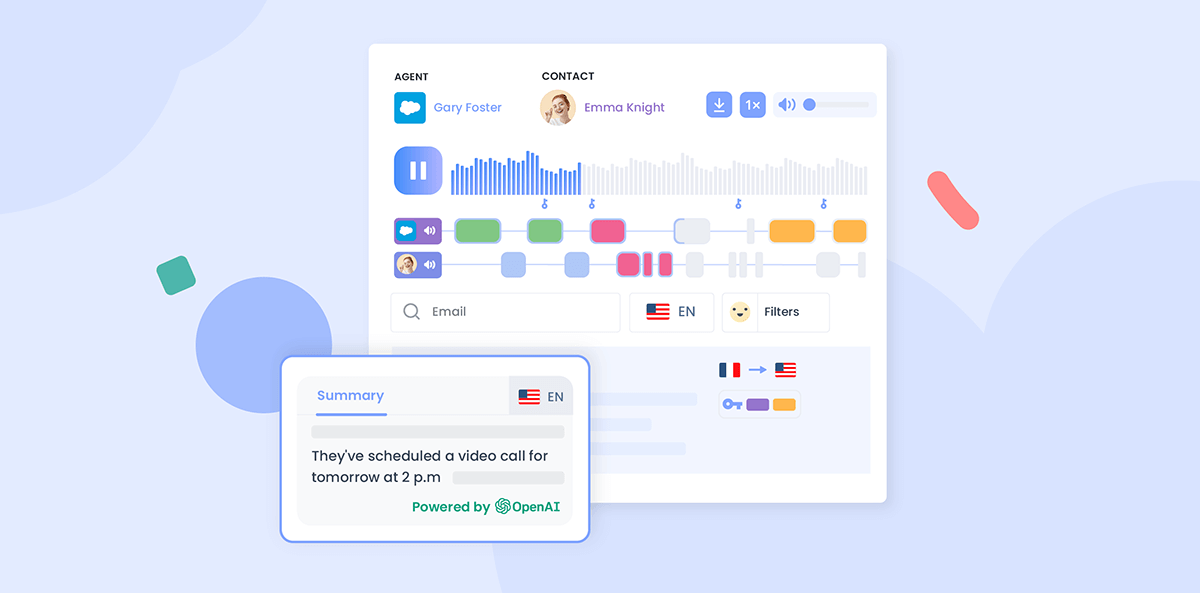
Ringover's Main Advantages ➕
- All-inclusive plans
- Unlimited inbound and outbound calls to international destinations
- Advanced telephony features like call recording, call monitoring, IVR menus, and more
Ringover's Disadvantages ➖
- May be too powerful a software for entrepreneurs
2. CloudTalk
CloudTalk is a cloud-based contact center software that is particularly popular with European businesses. It offers a modern user interface and is versatile enough to handle the needs of various teams. However, some users find its setup process to be complicated, and its pricing can lack transparency, making it difficult to determine the final cost.
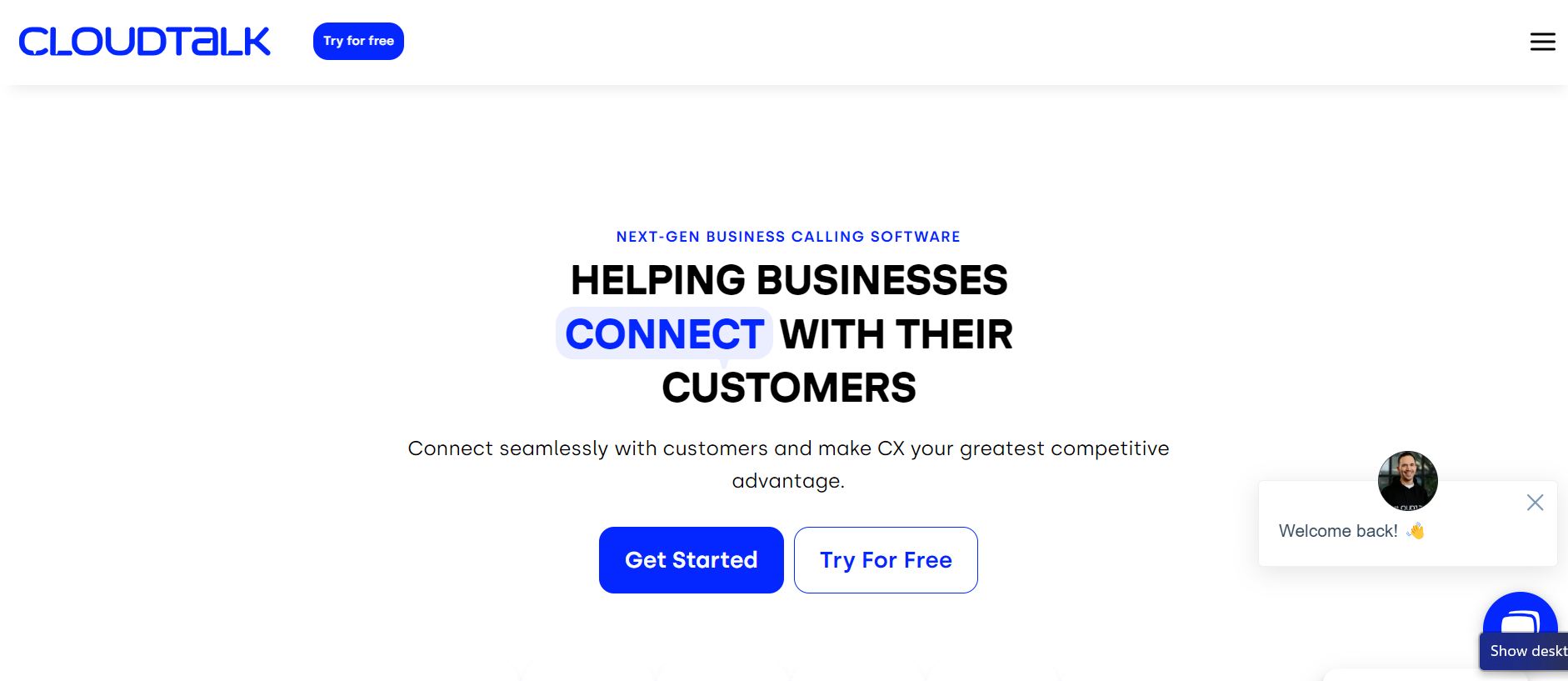
CloudTalk Advantages ➕
- Versatility
- Modern interface
CloudTalk Disadvantages ➖
- Complicated setup
- Lack of transparency on final prices
3. Avaya
Avaya offers communication and cloud services to optimize workflow. Its main solution is a CCaaS available in four packages. The service starts at $25 per month and offers unlimited national calls, chat, and 24/7 support.
However, this plan does not include IVR. This is a feature offered on their more expensive plans. Another important thing to keep in mind about Avaya is that many features are offered as add-on modules, and stacking them up will eventually increase your bill.
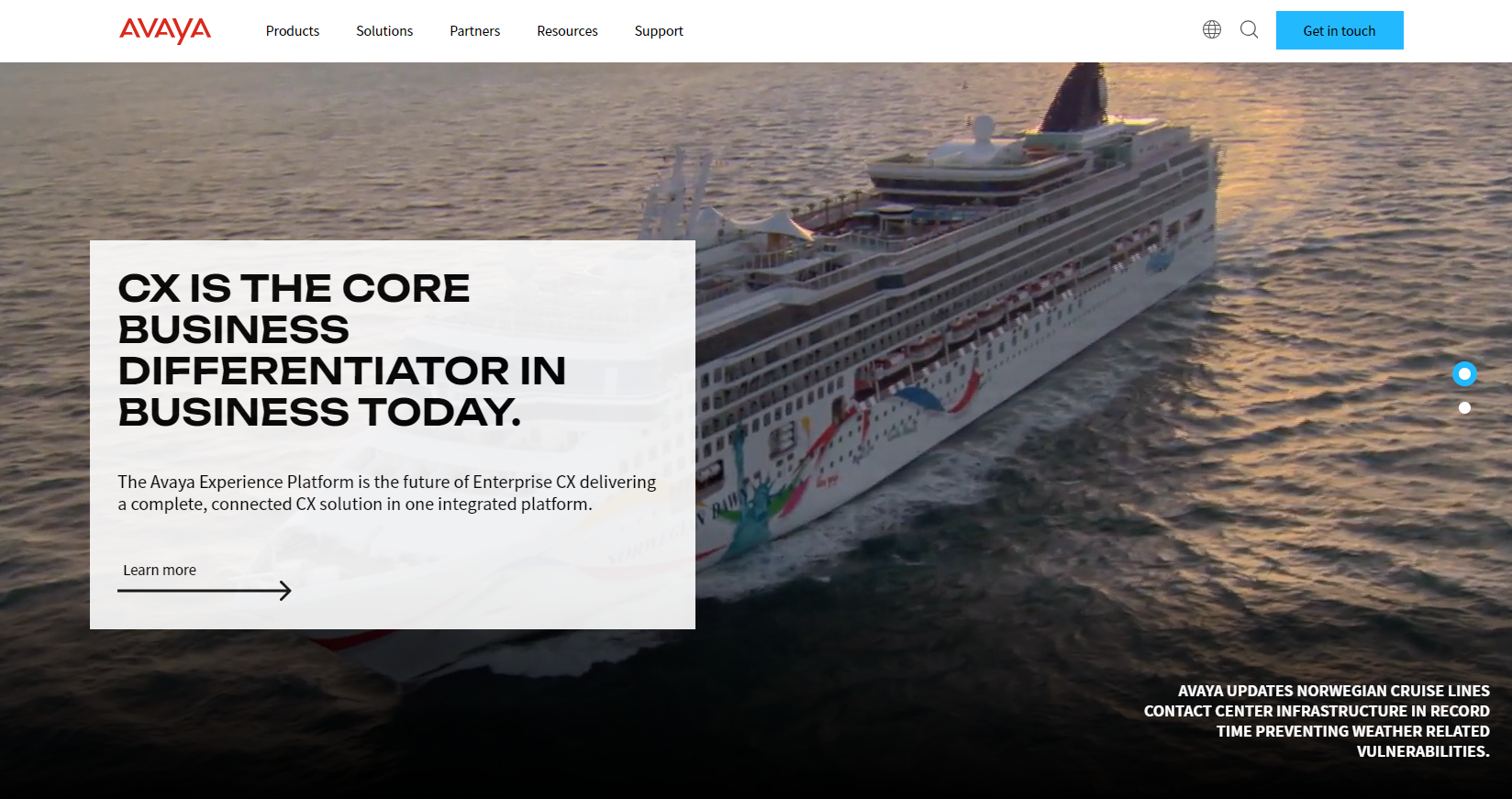
Avaya Advantages ➕
- Easy installation
- All packages include 24/7 phone support
Avaya Disadvantages ➖
- Key features such as call whispering and analytics are only available on the most expensive plans
- The most expensive plan is limited to 20 users
- Many add-ons drive up the price
4. 8x8
8x8 offers an all-in-one platform that combines voice, video, and chat into a single solution. It is a good option for businesses looking for unified communications. However, its most affordable plan includes a user limit, which can make it less scalable for small businesses that are planning to grow. You can compare business phone systems providers to see how 8x8 stacks up against other options.

8x8 Advantages ➕
- Certification for Microsoft teams
- Availability guarantee
8x8 Disadvantages ➖
- Some service plans limit the number of users
- Unlimited inbound/outbound calls are not available for all destinations
5. Vonage
Vonage is an American provider of cloud communications offering B2B services such as APIs and cloud contact center technologies.
However, Vonage is relatively expensive, and prices are more suitable for medium and large businesses. Additionally, Vonage offers a pricing plan that varies based on the number of users.
If you have fewer than five users, plans start at $19.99 per month. But with 20 users or more, plans offer the same features but start at $14.99 per month.
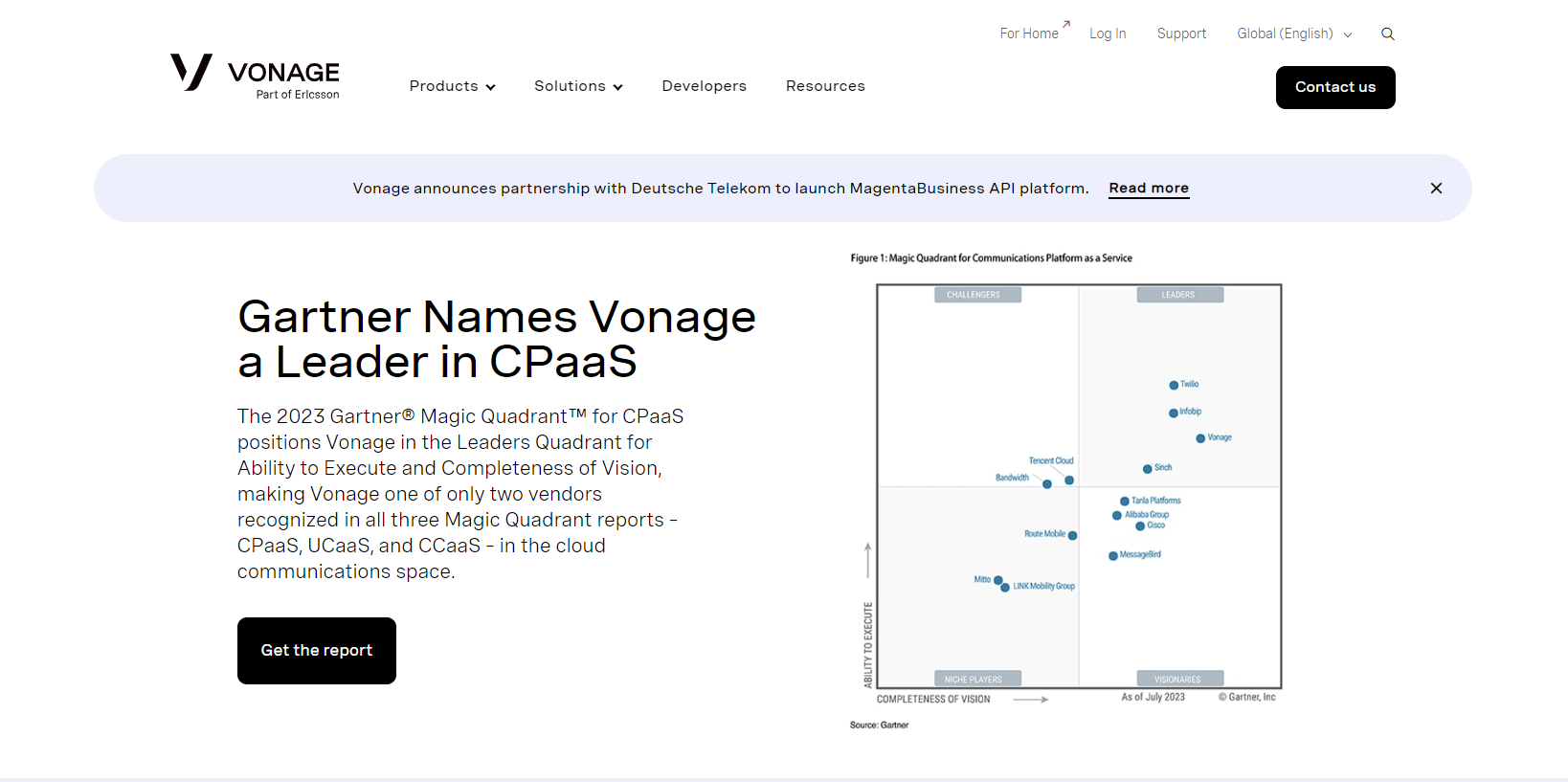
Vonage Advantages ➕
- Ideal for businesses with many users
- Vonage offers more than 20 integrations
Vonage Disadvantages ➖
- If you need accessories, the additional cost is considerable
- This can represent a costly pricing structure for small businesses
6. 3CX
3CX is a communication software initially based on Private Branch Exchange (PBX). 3CX allows you to make calls, do instant messaging, manage voicemail, or even video calls. 3CX stands out for its distribution model.
Indeed, the solution is not sold directly by its publisher but through a network of partners, whose members set more or less freely the final prices of their offers. In addition, 3CX is not a telecom operator, which explains its low prices.
Therefore, you will necessarily have to open a professional phone line with a compatible operator to benefit from it.

3CX Advantages ➕
- Live chat
- Free version
3CX Disadvantages ➖
- Video conferences limited to 25 participants
- No virtual numbers
7. CloudCall
CloudCall is a telecommunications service provider that allows you to integrate certain phone functions into your CRM for customer service.
This software and telecommunications solution helps companies improve their communications by automating some tedious tasks such as updating customer management software. By using CloudCall, companies can optimize business relationships with prospects and customers.

CloudCall Advantages ➕
- Wide range of integrations
- Simple configuration
CloudCall Disadvantages ➖
- Lack of transparency in pricing
- The list of features can be limited
8. Five9
Five9 is a leading provider of cloud contact center software that enables businesses to engage with their customers through various channels, including phone, email, chat, social media, and more.
Their platform offers advanced features like IVR (Interactive Voice Response), omnichannel routing, real-time analytics, and workforce optimization tools. With Five9, organizations can enhance their customer experience, increase agent productivity, and improve overall operational efficiency.

Five9 Advantages ➕
- Omnichannel communications available
Five9 Disadvantages ➖
- Little coverage, especially outside of USA
9. Nextiva
Nextiva is a unified communication platform that also offers its own customer experience software. This integration can be beneficial for teams that want all their tools in one place. Its primary drawback is a complex pricing structure that changes based on the number of users, which makes it challenging to predict monthly costs accurately. It is important to evaluate such factors when reviewing the best cloud phone systems for your specific needs.
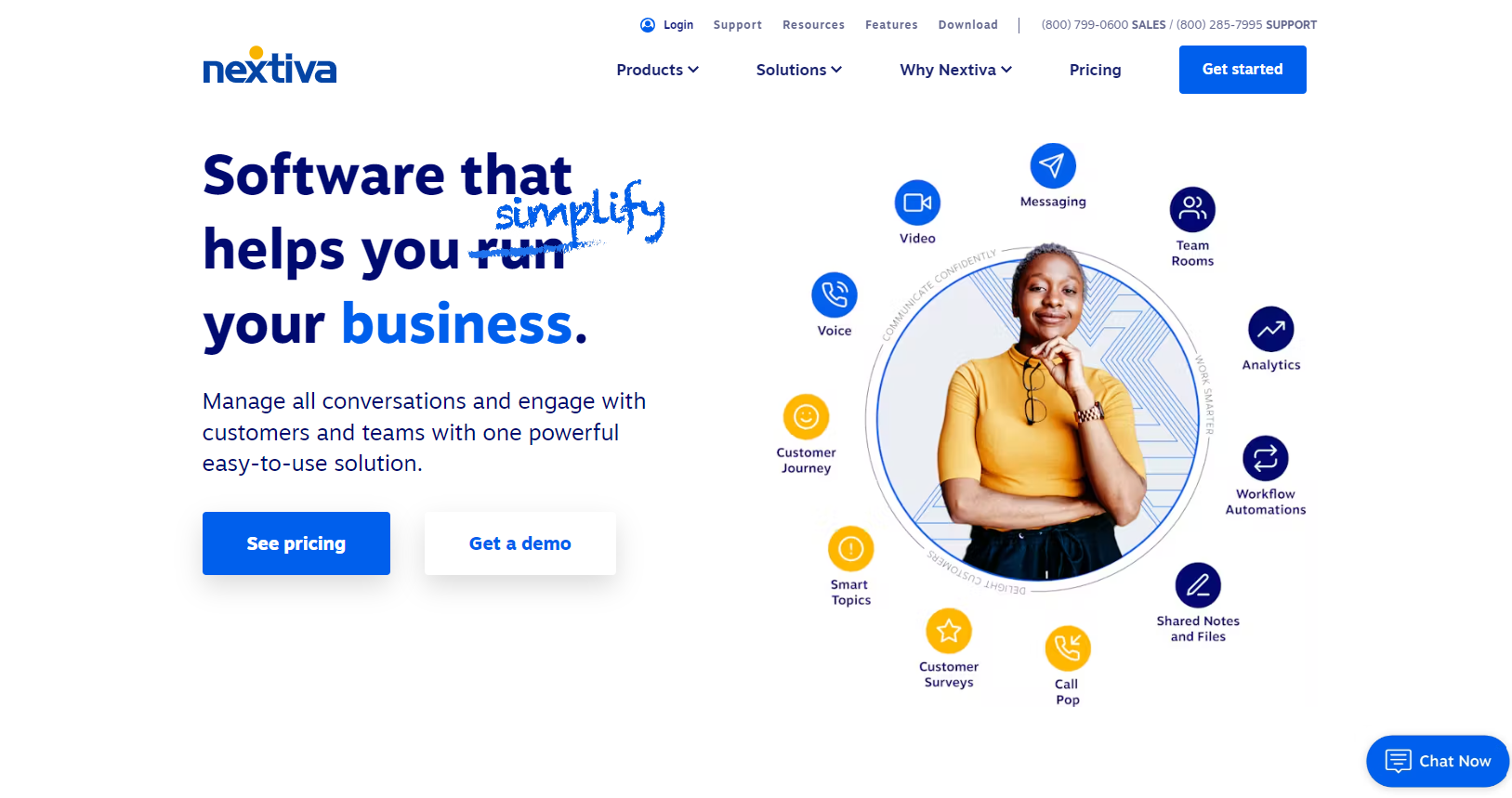
Nextiva Advantages ➕
- Huge range of services due to its longstanding status
Nextiva Disadvantages ➖
- Limited integrations
- Certain basic features like call recording or integrations are only included in the most expensive price plan
10. Ooma
Ooma is a VoIP solution designed mainly for small businesses. It is known for high-quality calling, but its feature set is relatively basic compared to other providers. A significant limitation is that its "unlimited" calling is restricted to the US and Canada, and using the service may require purchasing proprietary hardware.

Ooma Advantages ➕
- High quality calling service
Ooma Disadvantages ➖
- Barebones selection of features
- It appears you may need to purchase a device to use the service
11. Zoom Phone
Zoom Phone is a cloud phone system that functions as an add-on for businesses already using the Zoom ecosystem. Its main benefit is seamless integration with Zoom Meetings, which is convenient for existing users [3]. However, its disadvantages include a very limited feature set and a metered calling model where you pay per minute, which can drive up costs unexpectedly for active teams.
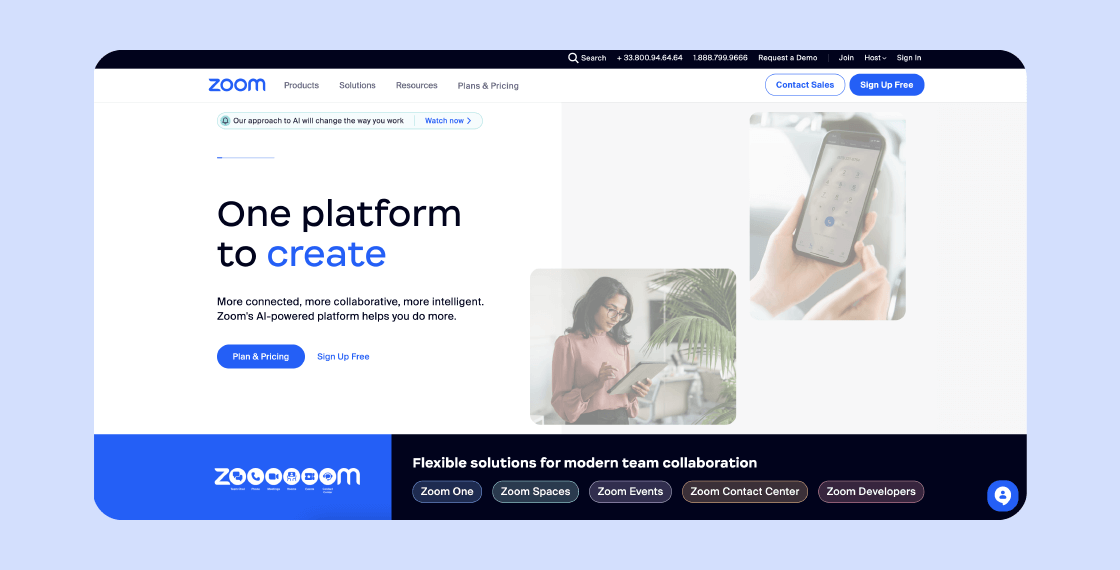
Zoom Phone Advantages ➕
- Easily integrates with Zoom's classic service
Zoom Phone Disadvantages ➖
- Very limited selection of features
- Very expensive for service provided
What is the Best JustCall Alternative for Your Business?
Following a thorough analysis of the leading competitors, Ringover emerges as the strongest JustCall alternative for most businesses. It provides a more comprehensive, transparent, and scalable solution without the hidden costs and reliability issues associated with JustCall.
Ringover delivers superior value by including unlimited international calling, advanced AI-powered analytics, and robust productivity tools in all its plans. As a top business phone system, it empowers teams to work more efficiently and make smarter, data-driven decisions.
Try Ringover for free to see why it is the best choice for your business.
JustCall Alternatives FAQ
How much does JustCall cost?
JustCall offers three plans, one at $30 per user/month, a second option at about $40 per user/month, with a final plan at $70 per user/month. There is also a fourth option which is price upon request, and is the only one to offer unlimited outgoing calls.
Who are JustCall's main competitors?
JustCall's main competitors include Ringover, CloudTalk, 8x8, Nextiva, Dialpad, Ooma, and Zoom Phone. Each offers a different combination of features, pricing, and specializations for various business needs.
What is the difference between VoIP and a cloud phone system?
VoIP (Voice over Internet Protocol) is the underlying technology that allows you to make phone calls over the internet instead of a traditional phone line. A cloud phone system is a complete, hosted communication solution that uses VoIP to deliver a wide range of advanced business features, such as interactive voice response (IVR), call analytics, and software integrations.
Published on April 17, 2024.

